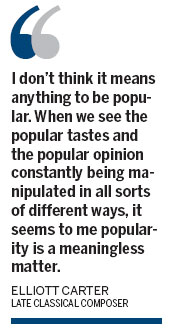Critics admire his complex and challenging work
Classical composer Elliott Carter, whose challenging, rhythmically complex works earned him widespread admiration and two Pulitzer Prizes, died in New York on Monday at age 103.
His music publishing company, Boosey & Hawkes, called him an "iconic American composer". It did not give the cause of his death.
In a 1992 interview with The Associated Press, Carter described his works as "music that asks to be listened to in a concentrated way and listened to with a great deal of attention".
The complex way the instruments interact in his compositions created drama for listeners who made the effort to understand them, but it made them difficult for orchestras to learn.
|
![File photo of composer Elliott Carter at the piano in his New York City apartment on May 2, 1960, after hearing that he had won his first Pulitzer Prize. [Photo/Agencies] US classical composer Elliott Carter dies at 103](../../images/attachement/jpg/site1/20121107/f04da2db1484120408a902.jpg) |
|
File photo of composer Elliott Carter at the piano in his New York City apartment on May 2, 1960, after hearing that he had won his first Pulitzer Prize. [Photo/Agencies] |
While little known to the public, he was long respected by an inner circle of critics and musicians. In 2002, The New York Times said his string quartets were among "the most difficult music ever conceived", and it hailed their "volatile emotions, delicacy and even, in places, plucky humor".
Carter had remained astonishingly active, taking new commissions even as he celebrated his 100th birthday in 2008 at Carnegie Hall.
"I'm always proud of the ones I've just written," he said at the time.
His new work for chamber orchestra, Instances, will have its world premiere in February 2013 when it is performed by the Seattle Symphony.
In 2005, his Dialogues, which had premiered the previous year, was a finalist for the Pulitzer Prize in music. And in 2006, his Boston Concerto was nominated for a Grammy Award as best classical contemporary composition.
Carter won his first Pulitzer Prize in 1960 for his Second String Quartet. His second award was in 1973 for his Third String Quartet. The Juilliard String Quartet chose to mark its 45th anniversary in 1991 with a concert of all four Carter string quartets. A fifth quartet came out in 1995.
When the first National Medal of Arts awards were given in 1985, Carter was one of 10 people honored, along with legends such as Martha Graham, Ralph Ellison and Georgia O'Keeffe. The awards were established by the US Congress in 1984.
The New Grove Dictionary of American Music said that at its best, Carter's music "sustains an energy of invention that is unrivaled in contemporary composition".

Carter said he found Europeans more receptive to his works than his fellow US citizens because music in Europe is not purely entertainment but part of the culture, "something that people make an effort to understand".
The lack of widespread attention did not seem to bother him. "I don't think it means anything to be popular," he said. "When we see the popular tastes and the popular opinion constantly being manipulated in all sorts of different ways, it seems to me popularity is a meaningless matter."
In 1992, Carter said his favorite piece of music was his Concerto for Orchestra, written in 1969. It was commissioned by the New York Philharmonic for its 125th anniversary season. "It particularly expresses a picture of the US as an evolving world of not only people but of nature," he said.
In addition to composing, Carter wrote extensively about 20th-century music. A collection of articles, The Writings of Elliott Carter: An American Composer Looks at Modern Music, was published in 1977.
Carter was born in New York in 1908. As a young man he became acquainted with composer Charles Ives, who encouraged his ambitions. He studied literature at Harvard and then studied music in Paris under famed teacher Nadia Boulanger, who guided Leonard Bernstein, Aaron Copland and Virgil Thompson.
As Carter turned 100, he recalled a visit to the hall in 1924 to see the New York premiere of Igor Stravinsky's revolutionary work The Rite of Spring.
"I thought it was the greatest thing I ever heard, and I wanted to do like that, too," Carter said. "Of course, half the audience walked out, which was even more pleasant to me. It seemed much more exciting than Beethoven and Brahms and the rest of them."
In 1939, he married sculptor Helen H. Frost Jones. They had one son. He is survived by his son and a grandson.
The Associated Press